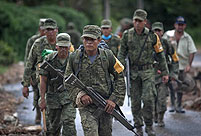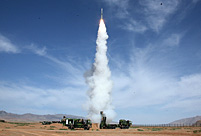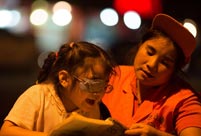Shanghai is on track to introduce an eating and drinking ban in its subway carriages despite the metro's operator questioning how the new regulation will be enforced.
City legislators are still debating details of the ban, with clarification expected on whether police or subway staff will enforce the regulation.
Article 30 of the draft lists eating and drinking in subway carriages as "forbidden acts," along with smoking, spitting, urinating, defecating and littering. Offenders could face fines of up to 500 yuan ($81.70).
Ding Wei, a deputy director of the legislative affairs commission of the Shanghai Municipal People's Congress, said the eating and drinking ban aims to improve the carriage environment for commuters, the Beijing News reported.
"More than 80 percent of respondents in our public survey supported banning eating and drinking [in subway carriages] to certain degrees," Ding said.
However, Lan Tian, a press officer for the Shanghai Shentong Metro Group, the city's subway operator, told the Global Times that it remains unclear who would enforce the ban.
"The regulation is still in its consultation stage. We are waiting for further details to be announced. We aren't sure if subway staff or police will be responsible [for enforcing the ban]," Lan told the Global Times on Saturday.
Lan said that subway authorities welcomed the eating and drinking ban, noting it would improve passenger etiquette.
But the ban has divided many commuters and lawmakers, some of whom doubt it can be enforced and question its humanity.
"If an elderly passenger wants to drink water, is it fair to ban him or her from doing so?" asked Chen Zhaofeng, a deputy of the Shanghai Municipal People's Congress.
Several Chinese mainland cities - including Wuhan, Hubei Province; Nanjing, Jiangsu Province; Xi'an, Shaanxi Province; and Shenzhen, Guangdong Province - already ban eating and drinking in subway carriages, with offenders facing fines of up to 200 yuan.
 Storms leave 97 dead, 58 missing in Mexico
Storms leave 97 dead, 58 missing in Mexico New model of indigenous surface-to-air missiles testfired
New model of indigenous surface-to-air missiles testfired  118.28-carat diamond to be auctioned in HK
118.28-carat diamond to be auctioned in HK Maternal love under streetlight
Maternal love under streetlight Naked foreign student sits in the middle of a road in Haikou
Naked foreign student sits in the middle of a road in Haikou  Colorful Yunnan: Enjoy the natural beauty
Colorful Yunnan: Enjoy the natural beauty Harbin named Chinese city with most beautiful women
Harbin named Chinese city with most beautiful women New college students' military training in Guangzhou
New college students' military training in Guangzhou Rugby girls
Rugby girls PLA's 38th Group Army conduct training
PLA's 38th Group Army conduct training Residences of the royal house of Savoy
Residences of the royal house of Savoy The last days of Wan Aihua
The last days of Wan Aihua Highlights at 12th National Games of China
Highlights at 12th National Games of China Beijing Film Academy welcomes freshmen
Beijing Film Academy welcomes freshmen Large mahjong party sets new world record
Large mahjong party sets new world recordDay|Week|Month